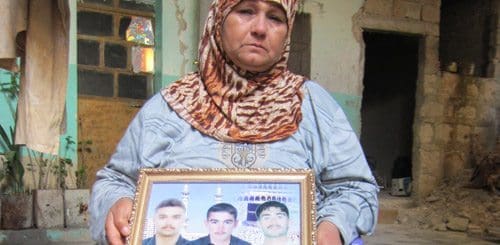"They killed my sons, the dearest things I had, and then they desecrated their bodies by setting them on fire. How can a mother endure such pain?"
The mother of three brothers dragged from their home, killed and burned in Sarmin on March 23, 2012
Syrian government armed forces and militias are rampaging through towns and villages, systematically dragging men from their homes and summarily executing them. They are burning homes and property and sometimes the bodies of those they have killed in cold blood. They are recklessly shelling and shooting into residential areas, killing and injuring men, women and children. They are routinely torturing detainees, sometimes to death.
In recent field investigations in Syria, Amnesty International has found disturbing new evidence of grave abuses – many of which amount to crimes against humanity and war crimes – committed by the Syrian army in towns and villages around Idlib, and Aleppo, as well as in the Jebel al-Zawiyah and Jebel al-Oustani areas (north-west of Hama) between late February and late May 2012. Towns and villages are being kept under virtual siege by troops who fire indiscriminately into these areas and target those moving in and out of them.
The patterns of abuses documented by Amnesty International in these areas are not isolated. Indeed, they have been widely reported elsewhere in the country, including in the attack by Syrian forces on Houla on 25 May 2012. According to the UN, 108 individuals, including 49 children and 34 women, were killed. Some were killed during the shelling of the village by Syrian security forces using heavy artillery and tanks, the use of which was confirmed by UN monitors; but most were summarily executed in cold blood by men in military clothing, believed by the residents to be state-armed militias.
In the face of increasingly brutal repression against peaceful protesters calling for freedom and reforms since February 2011, the unrest has turned increasingly violent. In August 2011, opposition groups formed the Syrian National Council, based in Turkey, as an umbrella group for many of those inside and outside Syria seeking to overthrow the government of President Bashar al-Assad. The opposition inside the country now includes armed groups, most loosely organized under the banner of the Free Syrian Army (FSA) who, along with a growing number of soldiers who have defected from Syria’s armed forces, have taken up arms against government forces.
In recent months, the situation appears to have evolved into an armed conflict in parts of the country. As armed confrontations between government forces and armed opposition groups have become more common, the frequency and brutality of government reprisals against towns and villages supportive of the opposition has escalated, in an apparent bid to punish the inhabitants for their known or suspected support for armed opposition groups, and to frighten them into submission.
Everywhere, residents described to Amnesty International repeated punitive raids by the state’s armed forces and militias, who swept into their town or village with dozens of tanks and armoured vehicles, in some cases backed up by combat helicopters, firing indiscriminately and targeting those trying to flee. At times, the army’s incursions came in the wake of attacks on government forces by armed opposition groups or clashes between the two sides. The outcome was the same in every case – a trail of death and destruction, much of it the result of deliberate and indiscriminate attacks.
Donate to Amnesty International to support research like this

